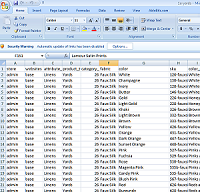 The continuously changing algorithms of Google's search engine ranking factors, including the PageRank factors, make it hard to determine what strategies to apply to current SEO campaigns. The recent Google Panda updates and resulting data, are relatively abstruse to connect to ranking and PR changes or whether the Google updates are even the cause of such change. And further research in speculations thriving from Google updates that may cause increase or decrease in PR, other than from Google Guidelines, often consist of rumors, considering that most algorithm changes aren't obviously exposed otherwise.
The continuously changing algorithms of Google's search engine ranking factors, including the PageRank factors, make it hard to determine what strategies to apply to current SEO campaigns. The recent Google Panda updates and resulting data, are relatively abstruse to connect to ranking and PR changes or whether the Google updates are even the cause of such change. And further research in speculations thriving from Google updates that may cause increase or decrease in PR, other than from Google Guidelines, often consist of rumors, considering that most algorithm changes aren't obviously exposed otherwise.
What we know is that Google intends to help visitors find what they are looking for and therefore helps provide significant information on how Search Engine Optimization specialists can do the same for their content and that of their clients. Knowing that, we can assume that every search algorithm update that Google makes intends to improve that experience for the users, hence making it more difficult to shortcut high website rankings with SEO techniques that may have been approved at one point.
Keep SEO Natural
Another important point that Google's search quality team highlights, quoting from the following interview, is:
[...]if you want to please Google with your SEO, then forget about SEO.[...]
The above has been brought up from multiple sources at Google and simply signifies the importance of investing in quality content and a good website that is user friendly, rather than focusing on ranking search results pages. Another example that occurred with some of our clients, who have had a website for over a year prior to our consultation, already had a PageRank factor of 2, only requiring on-site improvements leverage that for traffic. On the other hand, some sites may have had for very long without any increase, or even fallen in PR.
Ways to Avoid PageRank Loss
On the above mentioned link to the Google Webmaster Guidelines, you will find the section called: Quality guidelines - specific guidelines. This section explains the different techniques that may cause Google to devalue your website and its content, which can lead to PageRank dropping or, in some cases, becoming blacklisted on the Google search engine. At first glance, most site-owners may not identify any of non-recommended techniques on their sites, but sometimes these techniques still apply by accident, when attempting white-hat SEO. Here are some examples:
Auto-Generated Content: Purchasing Articles & Scraped Content Risks
Many site-owners and SEO's are already aware of content significance and the role it plays in keyword rankings and increasing web traffic. However, the common mistakes that are being made in this regard are: Copying content with making little to no changes to it; and attempting to generate unique content via paid articles and/or automatic tools (such as article rewriting tools/ a.k.a. content spinners).
Here are some of today's scenarios for the above examples:
- Copying product information from manufacturers when creating an eCommerce Store.
- Rewriting Articles from other high-quality sources and re-posting them: This is a common occurrence when hiring writers to write content about specific categories, un-related to their field of study, such as Medical or Technology related articles.
- Relying on content aggregated from other blogs, such as RSS feeds.
Link Schemes: How Link Building Can Backfire
Link building, whether building links on other sites to point to yours, or having links on your website pointing to another, can both have tremendous (positive and negative) effects on your sites PageRank and rankings. Google tries evaluate the links based on their relevance to the current pages content.
For example: If the current post is regarding clothing and a link is provided to a page on another website that is completely irrelevant, the post will lose credibility. This is done to prevent links being built with the intention to increase PR and search engine rankings, as well as the attempt to stop paid linking services.
Repetitive links, such as those commonly found in the sidebar and footer of websites, that link to external web-pages, should also avoid repetitious anchor texts, or even have a 'nofollow' attribute in some cases, to avoid negative effects.
Keyword Stuffing & Over-Optimization
Another common mistake is made when too many keywords are being stuffed into a page, often found on index pages, which derives from the misconception that the index / homepage of a website is meant to rank SERP's for all the main keywords. This usually also correlates with links being built mostly to the index page, instead of to the possibly more relevant sub-pages of a website. Some examples are:
- Recalling all services a website offers on all the pages, instead of linking to the actual pages specifically about the service.
- For local service websites, a similar blunder takes place when listing multiple locations on all pages, instead of having a page for each locations contact information (also see local SEO tips).
Negative & Spammy Content
Lastly, another issue that transpires is the creation of spam-similar content. Obviously, if the intention is to offer quality services/products to your visitors, this won't be a concern; However, if you are running a WordPress blog, eCommerce website, or similar Application type websites, it is important to prevent the generation of fake content, with the intention to spam or link to external websites. One of the most common forms of this are fake comments, usually auto-generated, that appear on WordPress posts. Similarly, this type of content can present as a fake review on an eCommerce product page, fake post submission on guest-post enabled blog sites and more.
Other Google PageRank Increase/Decrease Factors
This article attempted to capture the most often found SEO flaws that occur for the average site-owners, that do not intend to use any black-hat SEO techniques. There are many more strategies still being used today to manipulate rankings, nonetheless, we always recommend the most natural and recommended way to gain PageRank and overall strong rankings: Providing good quality and relevant content for visitors. We rely on Google to further its search technology to better identify what content is best for the users. Please feel free to add any other common SEO factors that are relevant, questions or possible revision suggestions.



Said on Feb 6, 2013 by Karan -